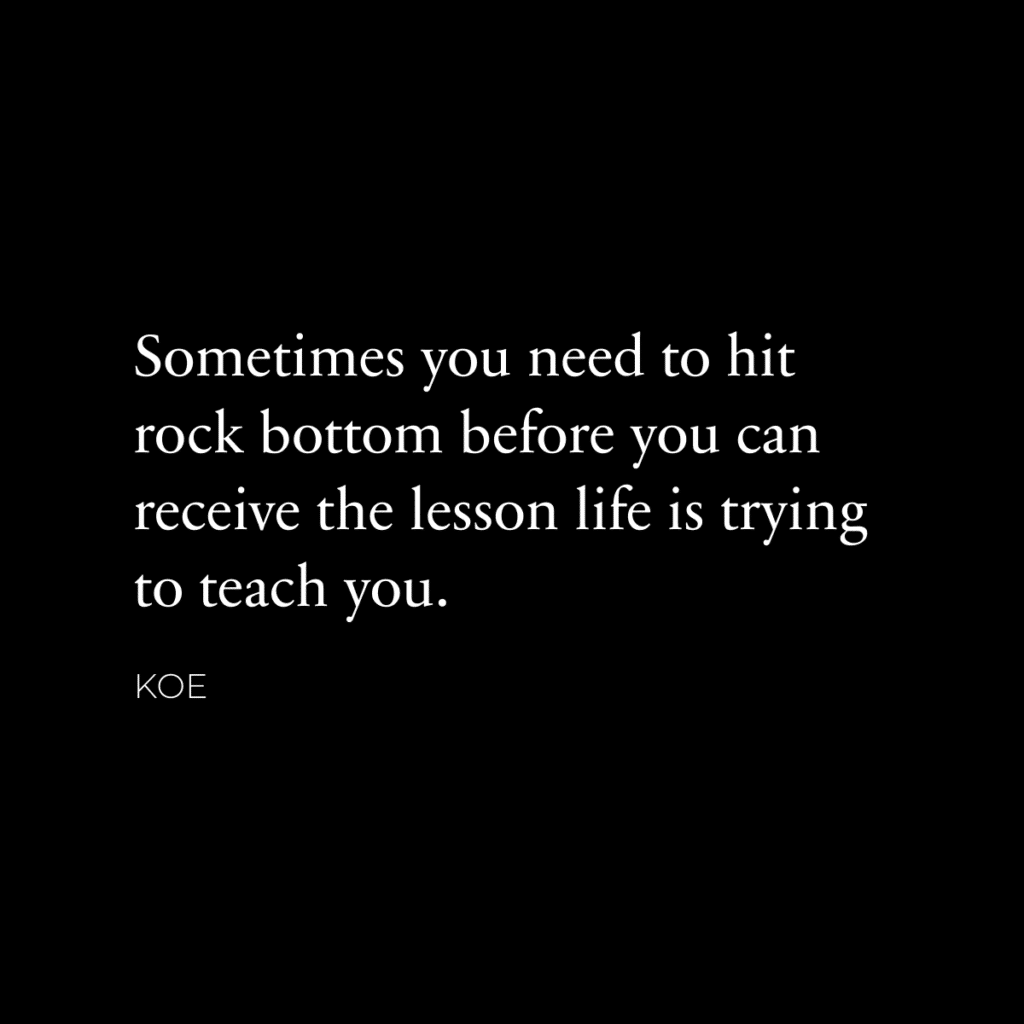
The worst place you can be is stuck right before rock bottom.
Not painful enough to change.
Just comfortable enough to stay the same.
I’m glad I got arrested that summer of freshman year in college.
What happened, you ask?
After my roommate’s girlfriend left him for another guy, he wasn’t feeling to great. He needed to slow down. The first available option to do that was, you guessed it, weed.
Myself, my roommate, and two other friends sat in my car in the parking garage across the street. We laughed and joked until one of the friends looked in the rearview mirror… “Guys, there’s a bike cop behind us.”
“That’s not funny, man,” I responded trying not to freak out, but when I looked for myself, he wasn’t lying.
Since this has nothing to do with reading, let’s get to the point.
My roommate and I got arrested.
We were booked, questioned about who sold us the drugs and sent back home that night.
The next morning, I didn’t think of it.
But months later, in 2016, when I was back home working my summer job as a lifeguard, I found a letter in the mailbox.
It had a government sigil on it.
Before I had time to think, my heart sank into my stomach.
My parents went home, so I ran inside and opened it.
I had 2 options:
Go to court and probably become a convicted felon for smoking an illicit drug on a school campus, or enroll in a drug diversion program where I’m tested every week on a random day. Oh, and the program cost a few thousand bucks that I did not have as an incredibly broke college student.
My mind was shattered to pieces.
Every negative outcome rolled through my mind like film on a projector.
I didn’t know what to do. I couldn’t tell my parents. I didn’t have the money. I couldn’t become a felon… my life was just starting. All of this for smoking and laughing with my friends?? Really?!
The worry turned to anger. The anger turned to defeat.
Then… an idea.
I was into fitness at the time and I remembered a book recommendation from a YouTuber I enjoyed learning from.
It was called The Power of Now.
Schools Made You Hate This Life-Changing Habit
Spirituality? That’s for hippies.
But I was desperate.
I would do anything to help my mind navigate the situation.
So, every morning for an hour at a time, I would sit on my dad’s porch with a cup of black coffee (the kind in the big blue container that tastes like it came from a week-old gas station dispenser).
The lessons hit hard.
So hard I couldn’t help but imagine how much knowledge I had been missing out on in my life by not reading beyond public school. Knowledge that could give me the tools to live a better life.
The funny thing is, if I hadn’t hit rock bottom, my mind would reject the abnormal ideas in the book.
The cool thing is, you don’t have to hit rock bottom to have the same effect.
The last books I actually chose to read were The Magic Treehouse and Alex Rider series. But that was more than a decade ago. After that point, I started to resent reading.
In high school, I was forced to read books I didn’t care about or have any interest in.
After discovering mindfulness and presence, my life changed. I was happier and at peace, and the negative situation didn’t seem to phase me. I handled it as it came. Life was good. Sometimes.
It also taught me about the trap of spiritual status very quickly. I would often get angry with my parents for “not getting it.”
“Like really Dad, you don’t want to end your suffering and be enlightened like me?”
Lol.
There are many lessons on spirituality I can share, but that’s not the topic of this letter.
Schools probably made you hate reading.
And thus, they made you hate learning.
If you hate learning, it’s safe to say that you have lost a lot of zest for life. Learning is a fundamental human drive.
Without it, activities aren’t as enjoyable.
Conversations aren’t as meaningful.
Your days feel repetitive and lifeless.
You don’t see your future changing much from the present.
But what if I told you there’s a life-changing habit hiding right under your nose?
The problem is that most people are still clones of the school system. They are on a life trajectory that they didn’t set.
If you want to create a fulfilling career, have better relationships, become more intelligent, rediscover life’s depth, and slow down in this busy distracted world…
Read.
Part 1) Reasons To Read
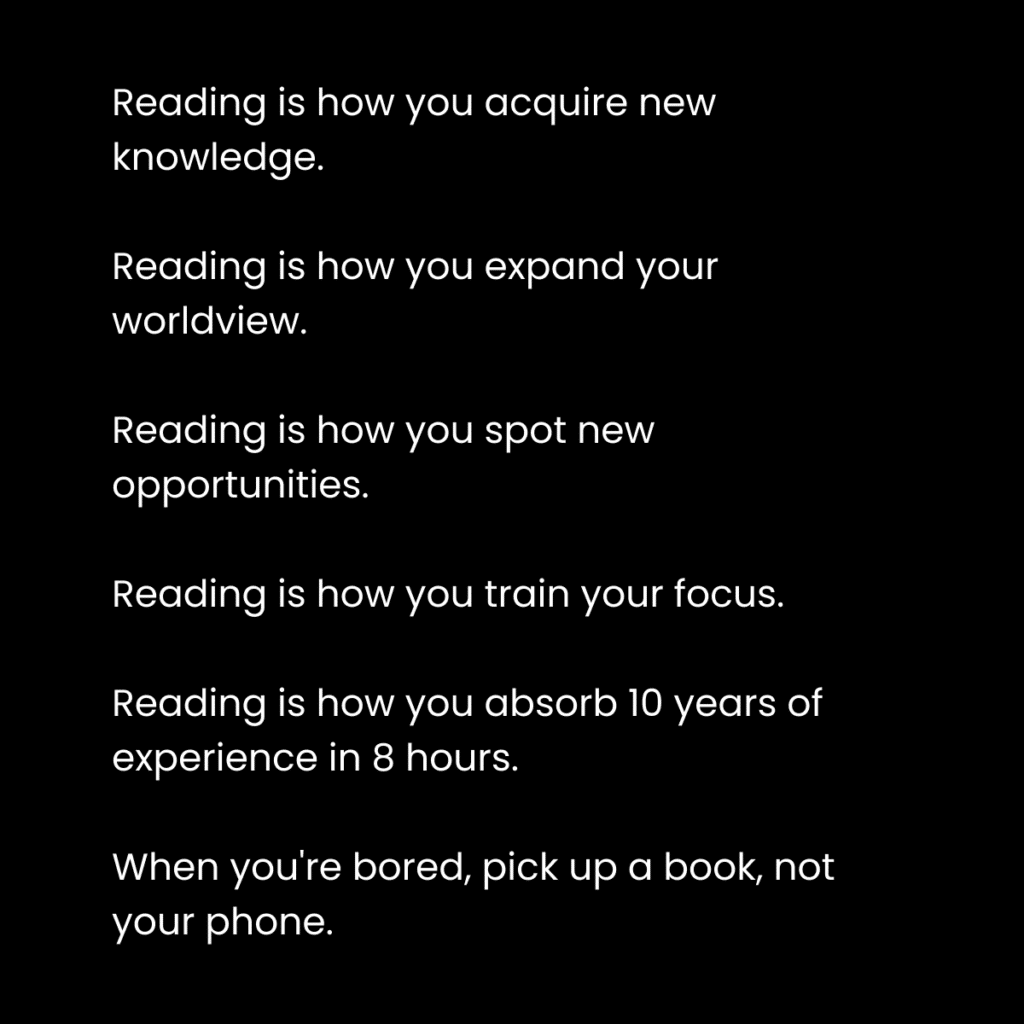
You don’t need a reason to read.
You don’t need a reason to improve your life.
You don’t need a reason to spend your time on this Earth being focused, fulfilled, and clear-headed.
But, as we all know, that’s not the reality of the modern world.
Let’s start with the fact that most people don’t realize what they’re missing out on. Now, stick with me, as this may get abstract, but if you understand the lessons, their effects can be profound.
1) You can only cook with what’s in the fridge.
This is from a video from Tim Demoss in his “Reasons To Read” series of videos. I’ve been binge watching them lately for the great ideas he provides (and to program myself to read more).
Your mind won’t notice new life-changing opportunities if you don’t have goals that open your mind and expand your awareness.
If you surround yourself with people who want to acquire certain credentials, such as a college degree, to get a high-paying job, your mind will only notice information and ideas that help you reach that goal.
But if you were to consciously re-educate yourself with new books, you would be exposed to novel ideas that allow you to create new goals for yourself.
Your awareness surface area expands.
You begin to connect new ideas in your life.
You notice an opportunity – that you wouldn’t have cared about or noticed before – that motivates you to do something new and unknown. Finally starting that business you’ve been putting off is a good example.
Then, and only then, can your mind begin to notice higher-level ideas that allow you to see progress in that domain. You’ll start to notice beginner, intermediate, and advanced strategies on social media, the algorithm will change to show you more, and you slowly reprogram your mind to achieve better goals in your life. This effect happens on more than just what you consume on social media.
Your goals have fundamentally changed.
Conversations with your friends start to shift. Your search history goes from something you probably shouldn’t be searching to things like “best business models of 2024.” Then, you get a little taste of what life could be. You will probably fail the first time around, and the second, as that’s just how it goes… but your potential will always be there. Even if you quit, it won’t stop nagging you. There’s no going back.
The point is this:
Life probably passes you by because you are exposed to the same information day after day. Life hasn’t changed much for you since you achieved the goals society set for you.
You can only cook with what’s in the fridge. And if your fridge doesn’t expand, you eat the same boring meal every single day (this isn’t always a bad thing, like for losing weight, but if your fridge is filled with junk, then it’s a very bad thing).
You need a new goal.
You need to self-educate to reach that goal.
That simple process alone will be responsible for much of the joy in your life.
True education is about curiosity and discovery, not memorization and conformity.
By the way, this is why we are building Kortex. To help you have a “second brain,” or a database of ideas that make writing seamless. Your “second brain” is the food in the fridge you cook with, haha. Soft launch date is mid-September 🙂 (Unless you want in on lifetime access).
2) The mind is a muscle that must be trained.
Many people obsess over physical health but rarely care about mental health.
Well… they care about mental health but use bandaid solutions to solve their disorder in consciousness.
Mental health is about sense-making, understanding, and clarity. Anxiety and depression, even if they stem from a chemical imbalance (I’m not saying this will cure it), are the product of a narrow mind focused on the familiar past or predictable future, often negative.
When you feel lost, it’s usually because you are in a chaotic life situation that you don’t have the knowledge or skill to make sense of. You can’t see a way out.
You aren’t where you want to be because you can’t lift the mental weight that allows you to get there.
You don’t have the knowledge or skill that allows you to be in that position in life.
The mind is the operating system for reality, and most people are running on Windows 98. Many others have devolved into a pager that beeps when they need to have a negative reaction to something that challenged the lines of government rhetoric in their software.
You change your life by reprogramming your mind.
Read more books that challenge your beliefs, expose you to how much you don’t know, and encourage you to change your behavior in a way that benefits your own life and others.
Don’t expect to do a mental 315 pound bench press on your first try.
Pass over the ideas you don’t understand. Your mind will slowly connect the dots as you continue your reading habit.
3) The best way to end bad habits is to replace them.
You can only have so many habits in your day.
One for your mind, one for your body, one for your work, one for your relationships. Minimum.
If you were to stop right now and audit your day, how many of the habits you unconsciously performed are actually helping your future?
When we observe society, it’s easy to assume that the number is close to zero. From there, it’s even easier to assume that (1) they aren’t happy and (2) they will be the same person, in the same position, with the same mind in 20 years.
Everyone knows that staring at a TV, at night, soaking in that unnatural blue light – that is probably contributing to skin cancer, especially if you aren’t getting sunlight throughout the day – isn’t good.
In that case, swapping that bad habit with reading could dramatically change more than just your mental health. It could potentially save your life.
Bad habits aren’t just bad because they take away time from having good habits; they slowly erode every other aspect of your life. Bad habits aren’t neutral in their effect. They are exponentially bad. Just as good habits, when consistent, are exponentially good.
“1% better every day” as they say.
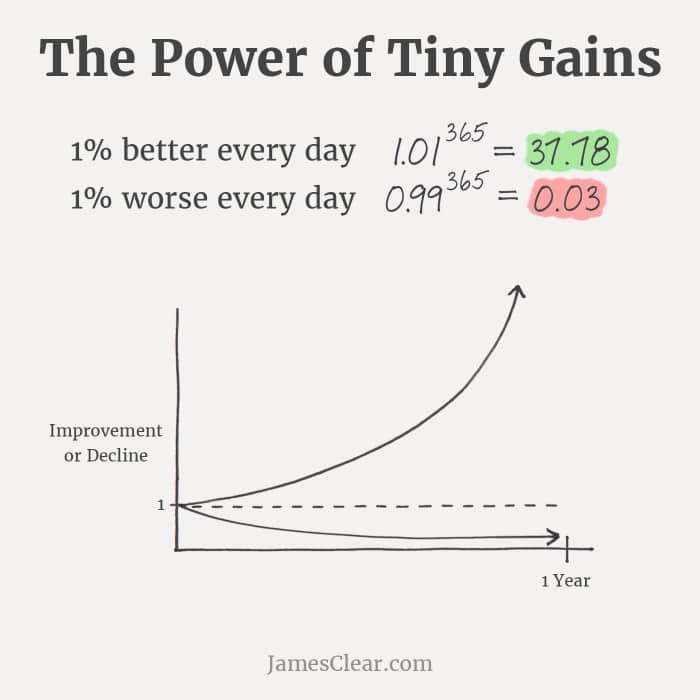
The questions now are:
What do I read that makes me want to adopt this habit?
How do I read to get the most out of this habit?
What are some tactics I can use to make this habit change enjoyable?
Part 2) What To Read
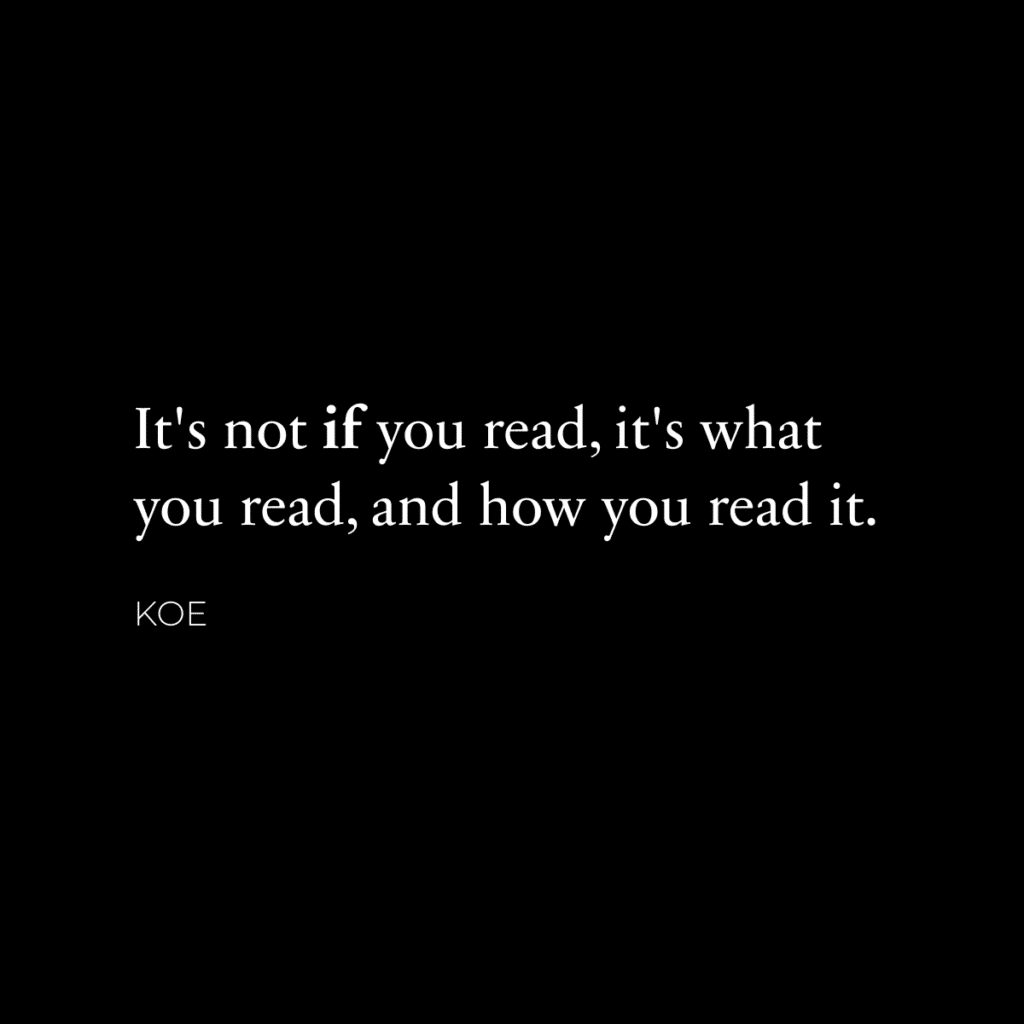
Have you ever contemplated the meaning of the word intention?
It’s rather powerful if you use it as an operating principle for your life.
In latin, intentio means to strain, stretch, or stretch out.
So to live an intentional life, what are you stretching towards? What are you struggling for?
Like a muscle being stretched and strained to build muscle, endurance, and strength, living with intention is how you build muscle in the mind by simply engaging with life. Because of that, it becomes much more meaningful.
When you stretch towards a goal that you choose, your mind demands nutrition to fuel that growth.
Then, and only then, can books help you.
If you aren’t doing anything unconventional with your life, reading won’t help you much. At a minimum, the intention to change your life must be there. Intention signals a mind that’s ready to receive instead of react.
Why is this necessary?
Because each person interprets a book differently.
One person with the goal of becoming a better CEO can read philosophy and the ideas will be applicable to his endeavors.
Another person can want a better relationship, read the same book, and see progress in that domain.
With that, any book, conversation, article, or information can help you achieve a goal. You don’t have to limit what you read, but there are types of books that will help you much more than choosing something random.
1) Read books that challenge you.
A challenging book is the perfect metaphor for diving into the unknown.
You don’t know what to expect.
You have difficulty making sense of it all.
But you take it one step, or page, at a time.
Things start to make sense. It feels good. You make connections, dopamine spurts into your brain, and progress is being made. Soon enough, you can’t put the book down. The ideas are life-changing. Your mind is flooded with potential.
I should start that business…
I should learn that skill…
I shouldn’t be distracted right now, I’ll go on a walk instead…
A challenging book teaches you more than just the ideas in the book. It teaches you one of the most important processes of life: progress.
You begin to understand that progress is not linear. Nothing happens, then everything happens. One moment, you’re lost in the darkness. The tension builds until the star explodes and creates atomic nuclei that spread across the galaxy. All of the little candles you lit along the way start to light up the room as a whole, allowing you to see that new domain of life with clarity and focus.
A challenging book won’t always make sense.
It will overwhelm you.
Don’t label this feeling as bad when it arises.
You’re supposed to feel overwhelmed.
Realize that confusion and overwhelm mean your mind is searching for answers and trying to learn. Don’t stop it.
2) Read what you love until you love to read. – Naval
The principles of habit formation apply to more than just books.
When you get started in the gym, it’s stupid to go in blindly, hopping to random machines, hoping that you will enjoy the process.
First, you research programs that align with your goals in life.
If you are a busy person, a 6-day high-volume bodybuilding split probably won’t be enjoyable for you. But a 3-day minimalist program would be perfect. Some will argue that’s not optimal for muscle growth, but your goal isn’t only muscle growth. You choose the program that is optimal for your goals, not someone else’s.
After that, following the program exactly as it is may work, but you may hate some exercises, making you want to skip leg day (as a common example haha).
This is your chance to research new exercises that you can swap out while retaining the impact of the program itself.
Now, as a newcomer in the gym, you have clarity on what to do when you get there (check number 1 for enjoyment and flow), you have exercises that you look forward to doing (check number 2), and because of both, you see more progress than if you were to do it any other way and become obsessed with the process (check 3). You have clarity. You have focus. Your mind doesn’t split to what people will think of you. The anxiety fades.
The same holds true for books you read and how you read them.
Like exercises in a mental gym, choose books that truly interest you.
Then, once it’s a foundational habit in your life, you’ll know what to read.
Effective habit formation happens through self-experimentation to find the intersection of what works and what you enjoy.
3) Read books that make you intelligent.
What is intelligence?
Intelligence is not about how much you know, it’s about how much you understand.
And since I supposedly can’t stop using Naval quotes:
If you understand it, you don’t need to memorize it.
If you don’t understand it, you don’t want to memorize it.
Banger.
Intelligence is holistic.
When we say someone is very intelligent, what we mean is that they have a higher ability for holistic pattern recognition.
They can make sense of the world by connecting the dots.
They have a deep sense of insight that leads to intuition, allowing them to make intelligent decisions.
On that note, intelligence is not book smarts. Book smarts are often used as a disguise to overanalyze risk, become narrow-minded and unable to see beyond that risk, leading to inaction and mediocrity. That is not intelligence.
Intelligence is not getting trapped in parts but swimming in wholes.
Someone who has studied a popular business strategy may be effective at that, but the person who has a deep understanding of business as a whole, big picture, will be able to create their own strategy and sustain their success regardless of how the industry changes.
Intelligence stems from generalism, not specialism.
Being a specialist often puts you in direct competition with other specialists. Confining your mind to that specialist frame prevents you from learning in connected domains that would allow you to be creative.
Intelligence is holistic, creative, and metaphysical.
So what are the best books you can read to cultivate a sense of intelligence?
Books that open your mind.
Books on holism, creativity, and metaphysics.
Alan Watts is an incredible example of being able to connect the universal to the practical. Here’s a long quote, but it may help you get the gist:
And these basic ideas I call myth, not using the word ‘myth’ to mean simply something untrue, but to use the word ‘myth’ in a more powerful sense. A myth is an image in terms of which we try to make sense of the world. Now, for example, a myth in a way is a metaphor. If you want to explain electricity to someone who doesn’t know anything about electricity, you say, well, you talk about an electric current. Now, the word ‘current’ is borrowed from rivers. It’s borrowed from hydraulics, and so you explain electricity in terms of water. Now, electricity is not water, it behaves actually in a different way, but there are some ways in which the behavior of water is like the behavior of electricity, and so you explain it in terms of water. Or if you’re an astronomer, and you want to explain to people what you mean by an expanding universe and curved space, you say, ‘well, it’s as if you have a black balloon, and there are white dots on the black balloon, and those dots represent galaxies, and as you blow the balloon up, uniformly all of them grow farther and farther apart. But you’re using an analogy–the universe is not actually a black balloon with white dots on it.
That, my friends, is intelligence.
7 Books That I Can’t Stop Reading
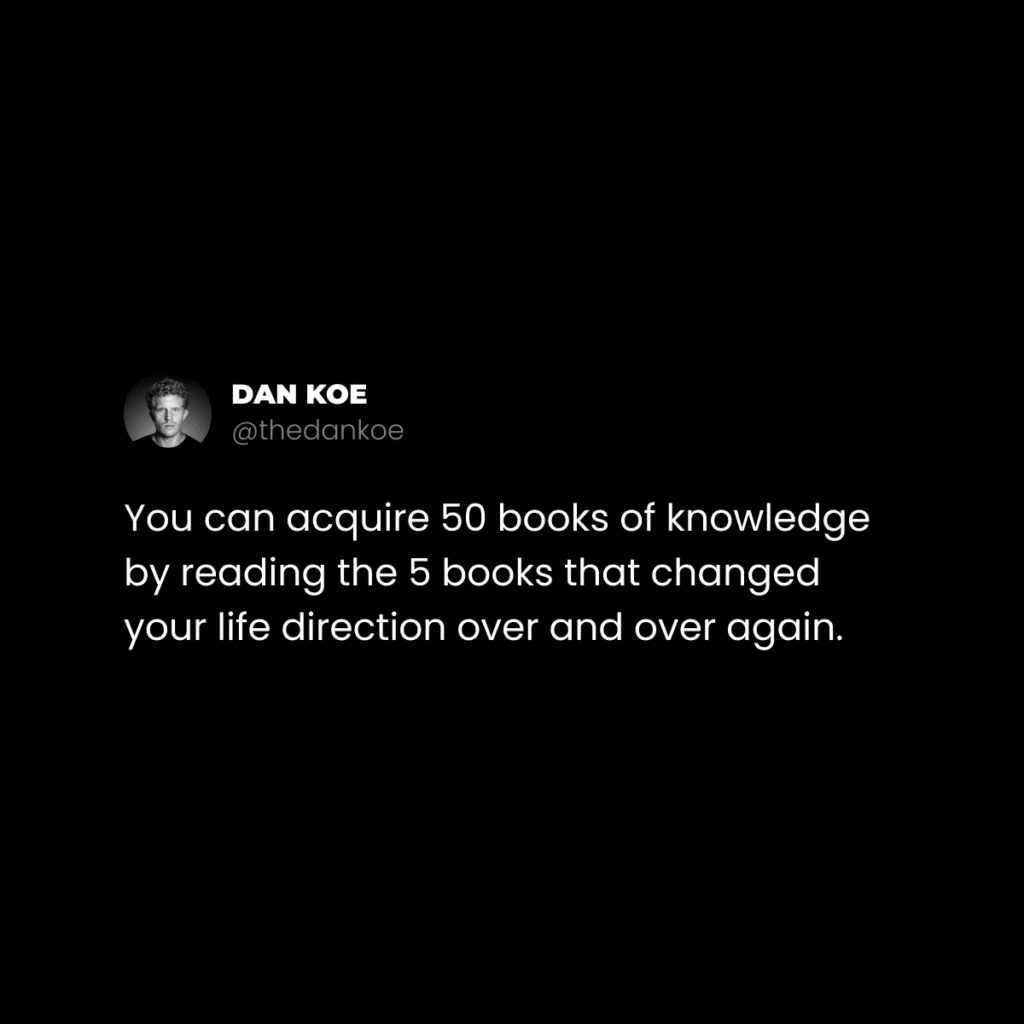
I used to fall asleep listening to Alan Watts.
(I should probably get back into that).
I could quite literally feel my mind opening. I could sense that my thoughts were able to go down new roads. I started to become able to make sense of things I didn’t understand before, but in a metaphorical sense as Watts did in the quote above.
By the way, this is exactly why I write as long of newsletters as I do. I don’t care to narrow your mind on a small piece every day. I want to help you feel that sense of an expanded mind that changed my life by presenting a fusion of connected ideas (this is yet another reason why we are building Kortex, to help others write in that manner).
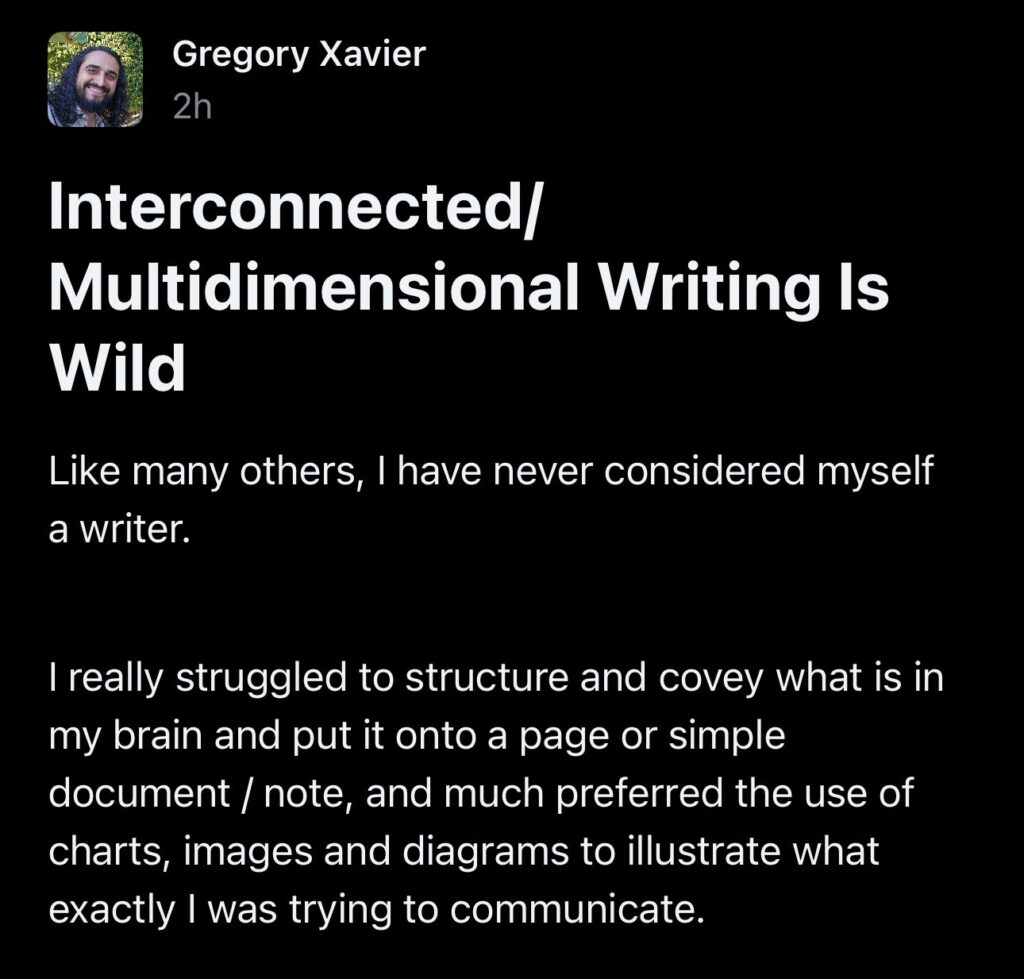
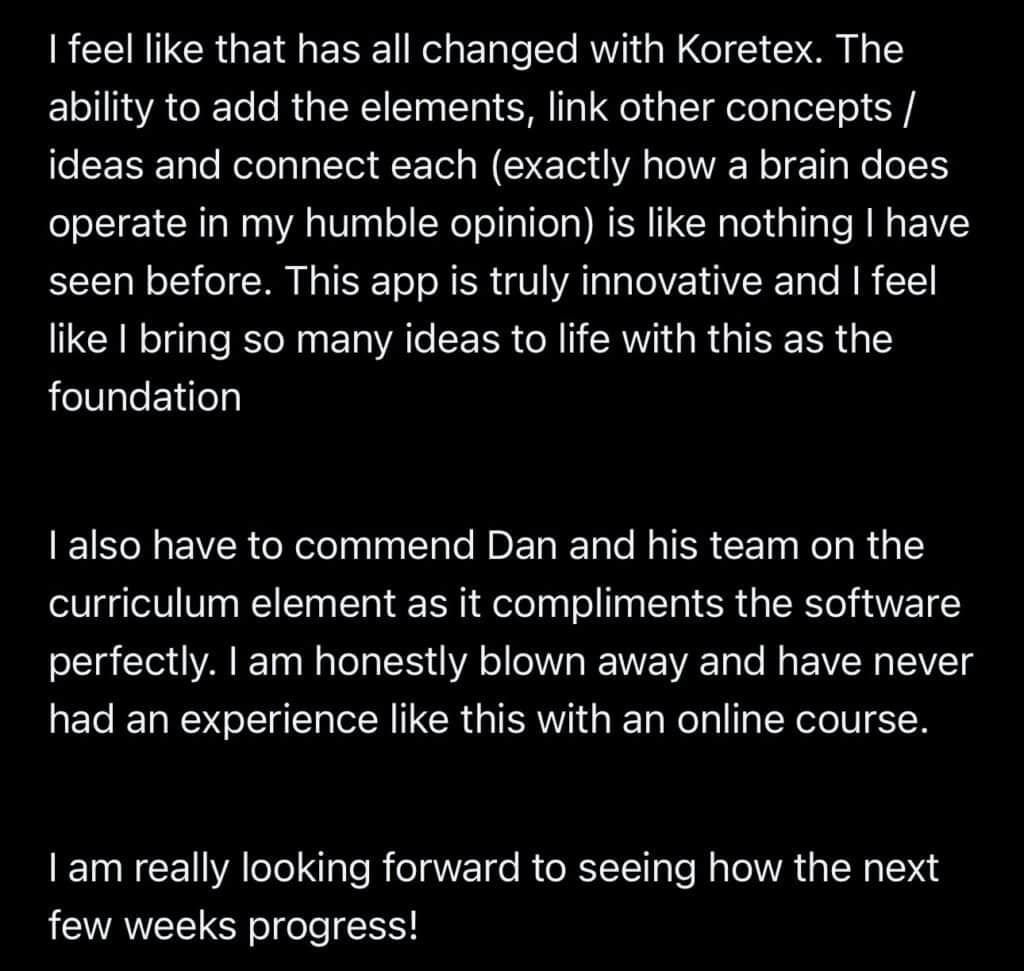
That’s an example from week 0 of our current Writer’s Bootcamp.
There are a few books I reread quite often.
Each time I read them, I discover something new and my understanding of life deepens.
I’m listing these in the order I think you will make the most connections. I am including these books specifically because if you read them all, your mind will light up with dopamine.
- The Art Of Impossible by Steven Kotler – A practical and scientific book on achieving the impossible.
- Flow by Mihaly Csikszentmihalyi – For understanding how to sustain enjoyment in your life.
- A Brief History Of Everything by Ken Wilber – To make sense of the world in a holistic manner.
- Awareness by Anthony De Mello – A refreshing and humorous series of lectures to help you not take life so seriously.
- Becoming Supernatural by Joe Dispenza – Potentially pseudoscience on – but nonetheless impactful in its lessons – changing your life by breaking the cycle of repetition in the familiar and the known.
- The Kybalion by The Three Initiates – An introduction to hermetic philosophy and the patterns of reality (some say this is not a good book for hermeticism, but I enjoyed it quite a bit).
- The Way Of The Superior Man by David Deida – A student of Ken Wilber writing on masculine and feminine dynamics and spiritual growth.
My life would not be the same without these books.
My own book, The Art Of Focus, is somewhat of a synthesis between all of these while connecting it to creative work and the internet for living a meaningful life.
If you’ve read my book and felt it was dense, I would highly encourage you to read through the others listed above.
Part 3) How To Read
Here’s how Cal Newport – author of Deep Work – reads 5 books a month:
- Choose more interesting books.
- Schedule reading sessions like you schedule exercise.
- Form a ritual and make it more enjoyable.
- Do closing pushes to finish books in one sitting.
- Take everything interesting off your phone.
In short, Cal is an expert at removing distractions from his life to make room for what he finds meaningful, important, and interesting.
Here’s what I personally do to ensure I maintain a reading habit.
1) Hunt for an idea or two, then put it down.
Most books can be understood by reading the first 2-3 chapters.
Books often open with the big picture then dive into technical details.
If you are looking for a process to experiment with to get a specific result in your life, then read the entire book.
If you are like myself or the creators/writers in my audience whose work revolves around novel perspectives and big ideas, you have my permission to stop reading once you find that “golden nugget” that spits some dopamine and excitement into your brain.
2) Go on a walk and listen to the book.
Yes, you get it, I love walks.
I treat them as creativity blocks (as opposed to the popular productivity blocks).
As a creative or knowledge worker, your productivity blocks are only as good as the ideas you have to be productive with.
Going on a walk removes you from the distractions of your home.
And, I’m sure there is science on how moving your body makes your brain more receptive to ideas.
3) Rotate different topics and genres for pattern recognition.
I often read 3 books at a time.
One physical, one Kindle, and one audio.
Sometimes I’ll listen to one of the same books I’m reading.
This allows me to have an array of big ideas in my mind that eventually lead to novel connections that I can write about.
4) Have books lying everywhere.
Embrace the chaotic creative lifestyle.
Leave books on your desk, kitchen counter, nightstand, by the toilet.
Have sticky notes everywhere in case an idea comes to mind, or use Kortex capture when it’s available later this year (sorry not sorry for teasing you about Kortex so much).
The goal is to make reading more interesting than your phone.
5) Create a reading space you love.
Outside of long walks, I love sitting in a private, quiet place with a nice cup of coffee to read.
One day I hope to have a room in my house specifically for reading. Nothing but books will be allowed inside of there.
For now, I sit on my patio.
Part 4) Writing Isn’t Just For Writers
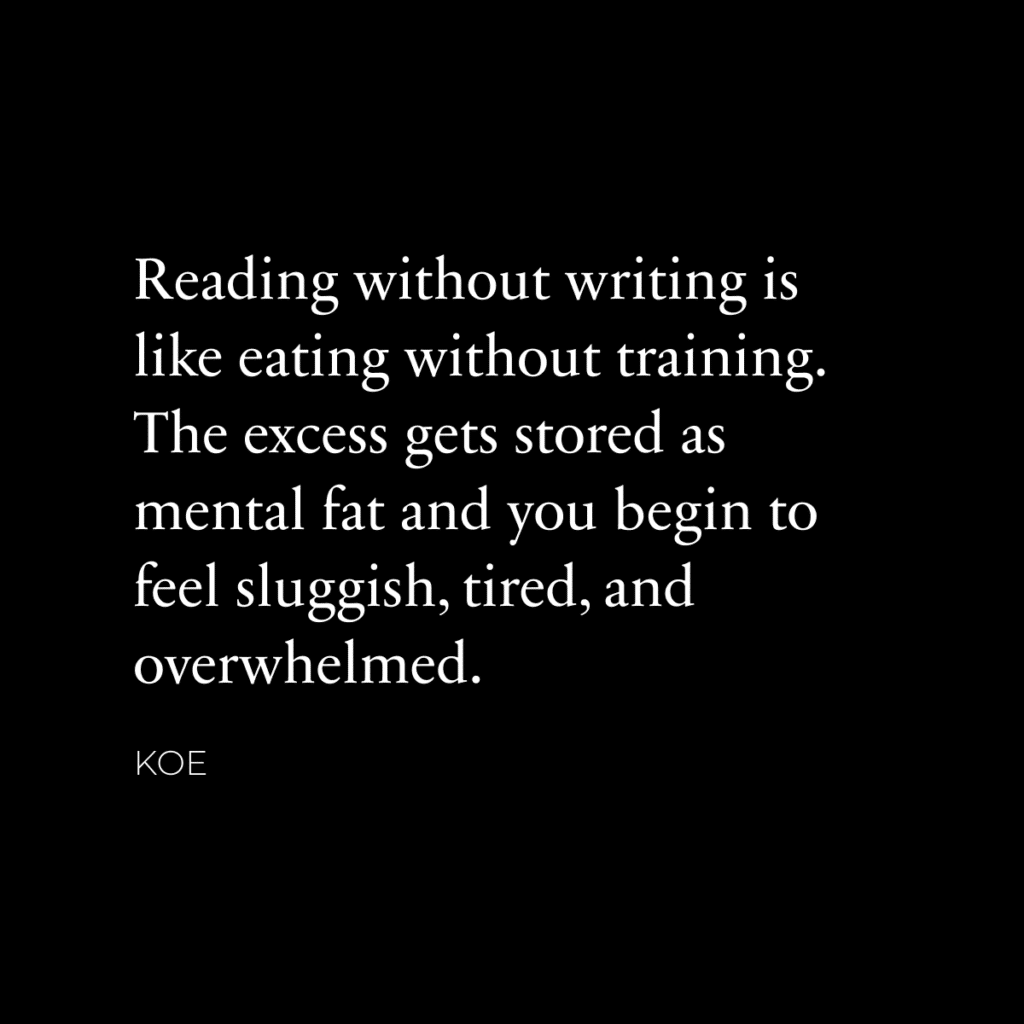
Writing = organized thinking.
Organized thinking = effective communication.
Communication = how to get what you want out of life.
Reading will only take you so far.
We’ve all met that person who has all of the ideas but hasn’t built anything worth following, using, or benefitting from.
Why are you reading?
Why have you made it this far in the letter?
For some, it’s about status. You want to say you’ve read a lot so you can seem like you’re doing something with your life to impress others.
That’s fine, but if you haven’t created anything that benefits humanity, the pursuit of status will leave you hollow.
You don’t need to identify as a writer to start writing.
You, as a human, are a creator. You build tools and solutions from the knowledge you acquire to survive and evolve. Quite different from animals.
You already write every day. It’s inherent to the human experience. Writing is how we as a species survive. We carved into rocks and wrote on papyrus to immortalize information that others can use to make progress faster and avoid dangers. No other species has done that. The ability to write is your edge.
You already write emails, texts, and notes to keep your mind from going insane with the abundance of information that comes along with technological progress.
Thanks to the internet, anyone can now write at scale, build an audience, and make a living with whatever skills or interests they cultivate that their audience can benefit from.
Where To Write
When I was a kid, I always imagined writing a book.
Then, I forgot about it for 10 years so that I could survive knowing the only path I was told: go to school, get a job, and retire. That didn’t sit well with me, but it was the only thing I knew.
Many people tell me they want to write a book, or they simply have dreams of doing something outside of society’s conventional and planned path for you.
The problem is that most of them have these dreams, but they think it just happens the moment they decide to do it. Okay, maybe they don’t think that, but they act like it.
They don’t realize that to write a book, you need a plethora of ideas to work with.
They don’t realize that to do your own thing, you need people who are willing to pay you for it.
Both require you to sit at your keyboard and type words in a specific sequence to reach that result.
For most people, the most affordable and accessible route to do this – thanks to technology as this is only possible at this point in evolution – is on social media.
You write short posts and threads to attract an audience.
Then, you start writing longer newsletters to nurture that audience.
Before you know it, you have thousands of posts and hundreds of newsletters that turn into a book or a loyal audience that loves what you do.
So, you start making progress toward your dreams by writing on social media.
It’s not the only path, but it’s one everyone – yes, everyone – can do.
Social media gave the human species immense power, but they confused that for entertainment, pleasure, and distraction.
What To Write About
You don’t need to pick a niche.
Your unique goals in life frame how you interpret and notice information around you.
When you read, you notice a completely different set of ideas than another person who reads the same book.
Your mind automatically tells you which ideas are important for your future.
So, you write about ideas that help you achieve your goals.
You write about your goals and how you are achieving them so you attract people with those same goals. That’s your niche. People who want to improve.
That combination alone makes you unique.
Stop focusing on your target audience or what niche to go into.
Start focusing on the essence of both of those.
You are trying to attract people you can help.
You can help people who have the same goals as you.
You write about the ideas, opinions, and advice that give people the firepower to achieve the goals.
Then, if you want to sell a product or service as I teach in Digital Economics, you have an audience that wants it from you, and they will probably tell you to create one by that point.
How To Write
Naval treats Twitter as his note-taking platform.
He reads a book, finds an idea, and shares it from his own perspective with his audience.
He finds the idea impactful, so he’s sharing it with the world and allows others who find it impactful to follow him.
It can be that simple.
Hunt for ideas, share ideas.
A beautiful flow of information that benefits both yourself and others.
Aside from that, impactful writing is about behavior change.
Your job is to write arguments that persuade, not force or deceive, people to make better decisions. That’s how you contribute to humanity.
The best way to think of this is writing to yourself.
All of my posts and newsletters are to me.
My profile is my public journal.
I convince myself to make better decisions (like to read more) so those ideas get enforced as a part of my identity. A better, more holistic identity.
If you get stuck writing about shallow and myopic topics like getting laid or making a quick buck and never thinking beyond that, you will become that… shallow and myopic. I’m not saying don’t write about these things, I’m saying cultivate a philosophy of depth and meaning behind them through education and experience.
Write to your past self and encourage them to improve. Show them how.
Write to your present self and program them to do better.
Write as your future self and give your current self advice.
When you read, take note of ideas that stick out to you. Take note of “aha!” moments. Take note of actionable advice you can experiment with and make your own.
And remember, you aren’t only sharing ideas you get from books.
Often, you use those ideas to achieve your goals and share the mindset and skill set that helped you achieve them.
Writing doesn’t have to be complicated. You don’t need my 2 Hour Writer course to engage in the process of trial and error.
If you do want education and templates to make that process faster, then sure, pick it up. I’m kind of obligated to promote it at this point. We’re talking about writing after all.
But, writing can just be writing.
You already do it.
Just start doing it in a way that leads to leverage and a better future.
Thank you for reading.
– Dan



